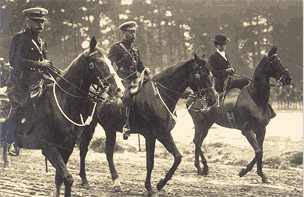Field Marshal Earl Haig
Douglas Haig (1861-1928) was born in Edinburgh. He was educated at Clifton School, Bristol, and Oxford University.
He entered the British Army in 1885, serving as a cavalry officer in the Sudan and distinguishing himself in South Africa during the Boer War (1899-1902). He then served under Lord Kitchener in India. From 1905 to 1909 he played an important role in reforming the British Army.
Commander in Chief
At the outbreak of the First World War in 1914, General Haig served as Commander of the First Army Corps of the British Expeditionary Force, and shortly after, in 1915, was promoted to Commander in Chief of the British Expeditionary Force, replacing Sir John French.
Somme and Passchendaele
Haig was instrumental in pursuing some of the great battles of attrition during the Great War, notably those of the Somme in 1916 and Passchendaele in 1917. These incurred a huge loss to the army, in terms of both men killed and those wounded — 60,000 on the first day of the Somme alone.
Greatly admired among his fellow officers, Haig was almost equally mistrusted by the Prime Minister. Lloyd George considered Haig to be wasting soldiers' lives without any prospect of victory.
Turning the tide of the war
By March 1918, during 'Operation Michael' — the major German offensive when the allies were forced back to within 40 miles of Paris — things looked particularly bleak for the Allied command.
Haig argued that the French leader, General Foch, should assume supreme control of the Allied forces during the crisis and by September of that year the tables had been turned on the Germans. An armistice brought the War to a close on 11 November 1918.
Opposing views of Haig's role
The part played by Haig in the events of the First World War has always been a subject of controversy. The opposing schools of thought seem irreconcilable.
Some see Haig as the 'saviour of the nation' who brought about the defeat of the German Army by a war of attrition on the Western Front.
Others view him as an incompetent butcher, unable to cope with the changing nature of warfare and leading untold thousands of young men to certain death for the price of a few yards of ground.
<< The General

